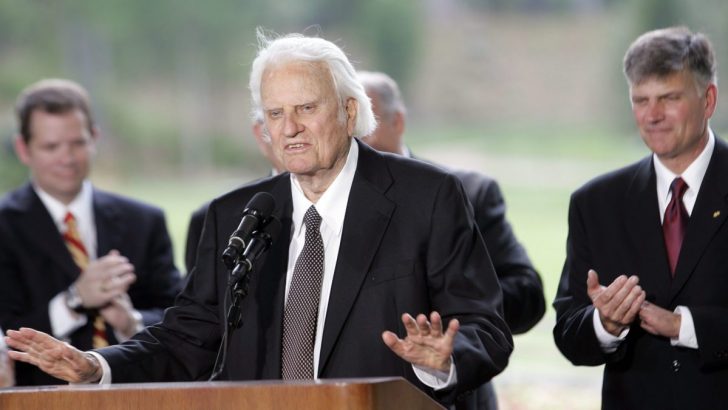Some of the things I like about Sunday Sequence (BBC Radio Ulster) are the variety of items and the decent length of the show, facilitating thorough discussion.
Last Sunday’s episode started with the state of charities in the wake of the Oxfam controversy. Andrew Dougal, a former charity CEO, mounted a robust defence of the sector. The needs were still there, he said, and it was our “bounden duty” to support the charities, though not uncritically.
Then, in a particularly touching interview, Alison Murdoch told of how her marriage relationship was put under pressure when her husband Simon went into a coma with encephalitis and after recovery underwent personality changes. Not entirely unrelated, Dr Helen Kingston spoke of her initiative in the town of Frome to give more community support to those with health issues rather than over medicalising the patients.
The main item was a fascinating discussion about the legacy of evangelist Billy Graham who died during the week. A texter summed him up as one who ‘“had flaws, but who never lost his passion for the Gospel”.
One contributor suggested there had been an element of anti-Catholicism in the early days (e.g. fear of JFK becoming President) but later common ground was found on the abortion issue. After Nixon, he had pulled back from being too close to any political establishment. He was against racism and desegregated his rallies, though he thought changes in legislation weren’t going to solve the problem – a spiritual awakening of the heart was needed.
This newspaper’s editor Michael Kelly spoke of the World Meeting of Families, especially on the fundraising aspects, and plans for the likely papal visit – he reckoned confirmation might come around St Patrick’s Day.
Finally, writer Helen Thomson spoke of her research into the fascinating aberrations of the brain, including the story of one man who went from drug addict to monk-like artist after a stroke, a woman with musical hallucinations, and a man who felt he was dead, showing little brain activity though conscious.
Developments
Meanwhile, south of the border, there were at least two significant developments in the Eighth Amendment debate. First off was the Supreme Court case where the State is seeking to overturn a High Court ruling that the unborn child has rights other than the right to life in the Eighth Amendment. Maybe it’s just a typical Government move to avoid incurring financial implications, but in the news reports it came across, to me, at least, as a mean-spirited attempt to deprive the unborn of any rights, prior to taking away their remaining one, the right to life, in the proposed referendum.
The arguments of the State lawyers are worth reading – they turned verbal cartwheels in their efforts to question whether the ‘unborn’ is legally a ‘child’ (as if it could or should be anything else), or a person (philosophical question surely?) or a citizen (and even if not strictly a citizen until born, surely it has the basic human rights, as those non-citizens in direct provision have?).
On The News at One (RTÉ Radio 1) on Wednesday of last week, Orla O’Donnell reported on that day’s proceedings and the arguments of the state lawyers. There was mention of “when rights are given to unborn” – but surely those rights are “acknowledged” not “given” – basic rights are not in the arbitrary gift of the state, and are inalienable.
On The News at One (RTÉ Radio 1) on Thursday, O’Donnell reported on the contributions of the lawyer for the family in the High Court Case. She described the State’s arguments as “extreme…striking…startling…absolutist”, effectively reducing the unborn child to a “constitutional nullity”. I found it hard to disagree.
The other issue that blew up was in relation to the Citizens’ Assembly, where irregularities were found in the recruitment process for recent sittings where new members were needed. On Morning Ireland (RTE Radio 1) last Thursday Joe Little, RTÉ’s Religious and Social Affairs correspondent, gave a detailed outline of the problem.
He described how it seemed that one employee of the Red C polling company was given a “disproportionate” number of new members to recruit and proceeded to breach the agreement made between the Assembly and Red C, sourcing replacements “through a network of friends and family”. Little noted the Pro-Life Campaign’s concerns and suggested that publication of the Red C audit “will hardly allay the fears of the skeptical”. Indeed.
Pick of the week
CATHOLIC LIVES
EWTN, Monday, March 5, 10am
Host David Kerr talks with former British Ambassador to the Holy See, Francis Campbell.
Magical Sites
RTÉ2, Monday, March 5, 10.50am
The children explore the ancient monastic yard at Monasterboice where they find amazing carved high crosses, a round tower and a medieval church.
Pilgrimage with Simon Reeve
BBC2, Monday, March 5, 3.50pm, also Tuesday & Wednesday
Simon Reeve explores the faith, the hopes, desires and even the food that helped to keep medieval pilgrims on the road.


 Brendan O’Regan
Brendan O’Regan American Evangelist Billy Graham featured on BBC's Sunday Sequence.
American Evangelist Billy Graham featured on BBC's Sunday Sequence. 